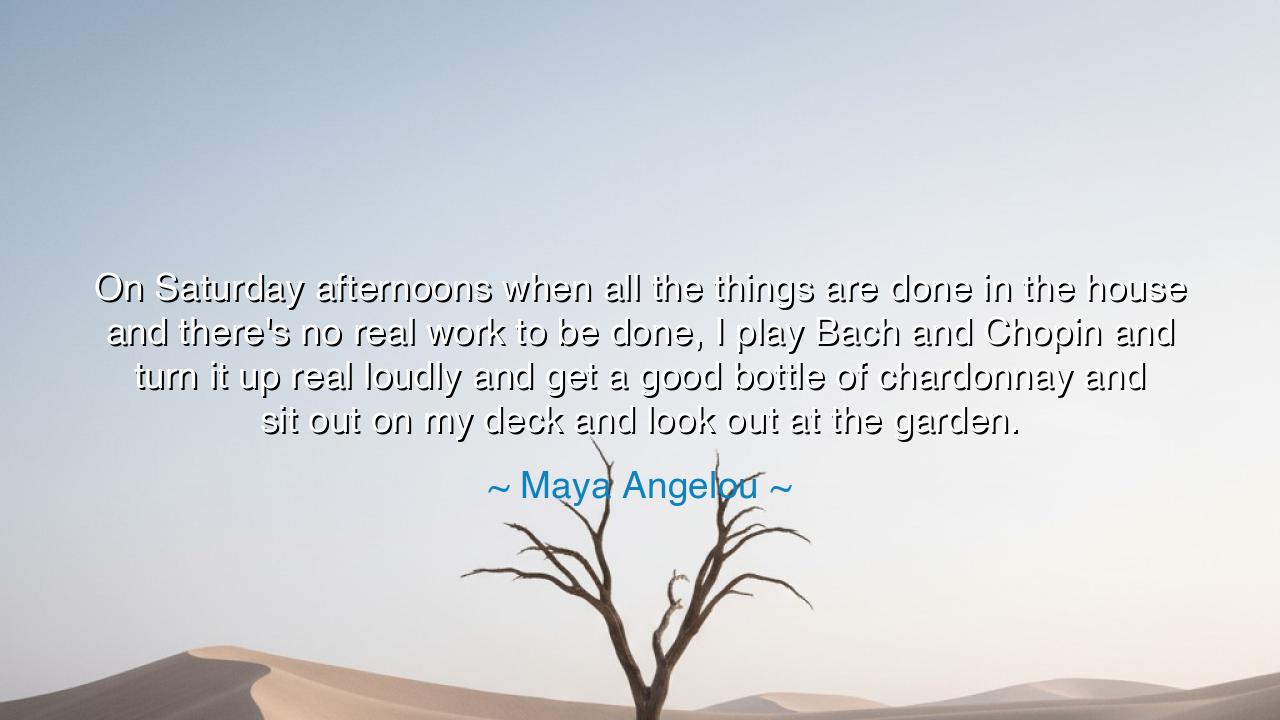
On Saturday afternoons when all the things are done in the house
On Saturday afternoons when all the things are done in the house and there's no real work to be done, I play Bach and Chopin and turn it up real loudly and get a good bottle of chardonnay and sit out on my deck and look out at the garden.






The words of Maya Angelou—“On Saturday afternoons when all the things are done in the house and there's no real work to be done, I play Bach and Chopin and turn it up real loudly and get a good bottle of chardonnay and sit out on my deck and look out at the garden.”—speak not merely of leisure, but of a sacred ritual of renewal. In this simple confession lies a truth that the ancients revered: that the soul, having labored faithfully, must be restored by beauty, by stillness, by music, and by the gentle gifts of the earth. This is not idleness, but balance—the harmony between toil and rest, between duty and delight.
When Angelou speaks of Bach and Chopin, she invokes the power of music as a temple for the spirit. Their melodies are not mere entertainment; they are rivers of order and passion, weaving discipline with longing. Bach, the master of structure, and Chopin, the poet of the heart—together they remind us that human life is both order and yearning, both reason and emotion. To fill the home with such music is to invite the wisdom of ages, to let harmony flow through the marrow of one’s being.
The mention of chardonnay and the garden recalls the old wisdom of Epicurus, who taught that true pleasure is not in excess but in simplicity: a cup of wine, a loaf of bread, a view of growing things. To sit in stillness with nature, wine, and music is to participate in life’s quiet banquet, the feast that does not consume but nourishes. The garden itself, in Angelou’s words, becomes a mirror of the self—cultivated, alive, and full of mystery, reminding us that beauty surrounds us when we take time to see.
History is filled with echoes of this practice. Marcus Aurelius, the philosopher-king of Rome, would steal moments in his military campaigns to write reflections in his Meditations. Surrounded by duty and battle, he knew the necessity of retreating inward, of nourishing his soul amidst the storm. Angelou’s Saturday ritual is the same in essence: a sovereign act of the spirit, reclaiming peace and grounding oneself in the face of a demanding world. It is a heroic act of self-preservation, wrapped in the quiet garments of wine, music, and a garden view.
The meaning of Angelou’s ritual is both intimate and universal. Each of us carries burdens of labor—whether of the home, the field, or the mind. Yet if we do not pause, if we do not honor the rhythm of rest, our spirits grow thin and brittle. Angelou reminds us that the time of completion, when “all the things are done,” is not merely the absence of work but the opening of a doorway to joy. Leisure here is not waste—it is renewal, a return to self, a preparation for the days to come.
For us, the lesson is profound. We must create our own rituals of rest, small sanctuaries in the week where we lay down our tools and lift up our spirits. It may be through music, as Angelou does. It may be through nature, through writing, through conversation, or through silence. What matters is not the form, but the presence: the willingness to sit with life, unhurried, grateful, and whole.
The practical path is clear: choose a time each week, as Angelou chose her Saturday afternoons, and mark it as sacred. Let it not be stolen by endless duty or consumed by distraction. Fill it with something that awakens your spirit—be it art, nature, or fellowship. Protect it fiercely, for it is the wellspring of strength. Just as gardens must be watered to bear fruit, so must the soul be tended with care.
Thus, let this wisdom be passed on: life is not only for labor, nor only for striving. It is also for savoring—for the music that stirs the heart, the wine that warms the spirit, and the garden that renews the eyes. Like Maya Angelou, let us honor the balance, and in doing so, we shall find not only peace but power—the quiet power of a soul well-nourished, ready to rise again to the work of the world.






AAdministratorAdministrator
Welcome, honored guests. Please leave a comment, we will respond soon